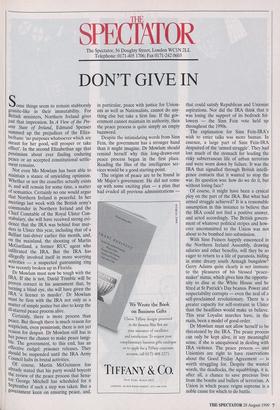SPECTATOR
The Spectator, 56 Doughty Street, London WC1N 2LL Telephone: 0171-405 1706; Fax 0171-242 0603
DON'T GIVE IN
Some things seem to remain stubbornly granite-like in their immutability. For British ministers, Northern Ireland gives Just that impression. In A View of the Pre- sent State of Ireland, Edmund Spenser summed up the prejudices of the Eliza- bethans: 'no purposes whatsoever which are meant for her good, will prosper or take effect'. In the second Elizabethan age that pessimism about ever finding enduring peace or an accepted constitutional settle- ment remains.
Not even Mo Mowlam has been able to maintain a stance of unyielding optimism. Whether or not the ceasefire actually exists Is, and will remain for some time, a matter of semantics. Certainly no one would argue that Northern Ireland is peaceful. In her meetings last week with the British army's commander in Northern Ireland and the Chief Constable of the Royal Ulster Con- stabulary, she will have received strong evi- dence that the IRA was behind four mur- ders in Ulster this year, including that of a Belfast taxi-driver earlier this month, and, on the mainland, the shooting of Martin McGartland, a former RUC agent who infiltrated the IRA. But the IRA has allegedly involved itself in more worrying activities — a suspected gunrunning ring was recently broken up in Florida. Dr Mowlam must now be tough with the IRA. If she is not, David Trimble will be proven correct in his assessment that, by turning a blind eye, she will have given the IRA 'a licence to murder'. Dr Mowlam must be firm with the IRA not only as a Matter of simple justice but also to keep the ill-starred peace process alive.
Certainly, there is • more process than Peace. But though there is much reason for scepticism, even pessimism, there is not yet reason for despair. Dr Mowlam still has in her power the chance to make peace tangi- ble. The government, to this end, has an effective cudgel: prisoner releases. They should be suspended until the IRA Army Council halts its brutal activities.
Of course, Martin McGuinness has already stated that his party would boycott the review of the peace process that Sena- tor George Mitchell has scheduled for 6 September if such a step was taken. But a government keen on ensuring peace, and, in particular, peace with justice for Union- ists as well as Nationalists, cannot do any- thing else but take a firm line. If the gov- ernment cannot maintain its authority, then the peace process is quite simply an empty buzzword.
Despite the intimidating words from Sinn Fein, the government has a stronger hand than it might imagine. Dr Mowlam should remind herself why this long-drawn-out peace process began in the first place. Reading the files of the intelligence ser- vices would be a good starting-point.
The origins of peace are to be found in Mr Major's government. He did not come up with some exciting plan — a plan that had evaded all previous administrations — that could satisfy Republican and Unionist aspirations. Nor did the IRA think that it was losing the support of its bedrock fol- lowers — the Sinn Fein vote held up throughout the 1990s.
The explanation for Sinn Fein-IRA's wish to enter talks was more human. In essence, a large part of Sinn Fein-IRA despaired of the 'armed struggle'. They had lost much of the stomach for leading the risky subterranean life of urban terrorists and were worn down by failure. It was the IRA that signalled through British intelli- gence contacts that it wanted to stop the war. Its question was: how do we do it, but without losing face?
Of course, it might have been a cynical ploy on the part of the IRA. But what had armed struggle achieved? It is a reasonable assumption in this instance to believe that the IRA could not find a positive answer, and acted accordingly. The British govern- ment of whatever political stripes and how- ever uncommitted to the Union was not about to be bombed into submission.
With Sinn Feiners happily ensconced in the Northern Ireland Assembly, drawing salaries and other benefits, will they be so eager to return to a life of paranoia, hiding in some dreary south Armagh bungalow? Gerry Adams quite clearly is not immune to the pleasures of his blessed 'peace- maker' status, which gives him the opportu- nity to dine at the White House and be feted at St Patrick's Day beanos. Power and respectability corrupts — even the zeal of a self-proclaimed revolutionary. There is a greater capacity for self-restraint in Ulster than the headlines would make us believe. This year Loyalist marches have, in the main, been a model of good order.
Dr Mowlam must not allow herself to be threatened by the IRA. The peace process can only be kept alive, in any meaningful sense, if she is unequivocal in dealing with IRA violence. The peace process — and Unionists are right to have reservations about the Good Friday Agreement — is worth struggling for. Despite the wasted words, the deadlocks, the squabblings, it is, after all, a chance to save precious lives from the bombs and bullets of terrorism. A Union in which peace reigns supreme is a noble cause for which to do battle.


























































 Previous page
Previous page